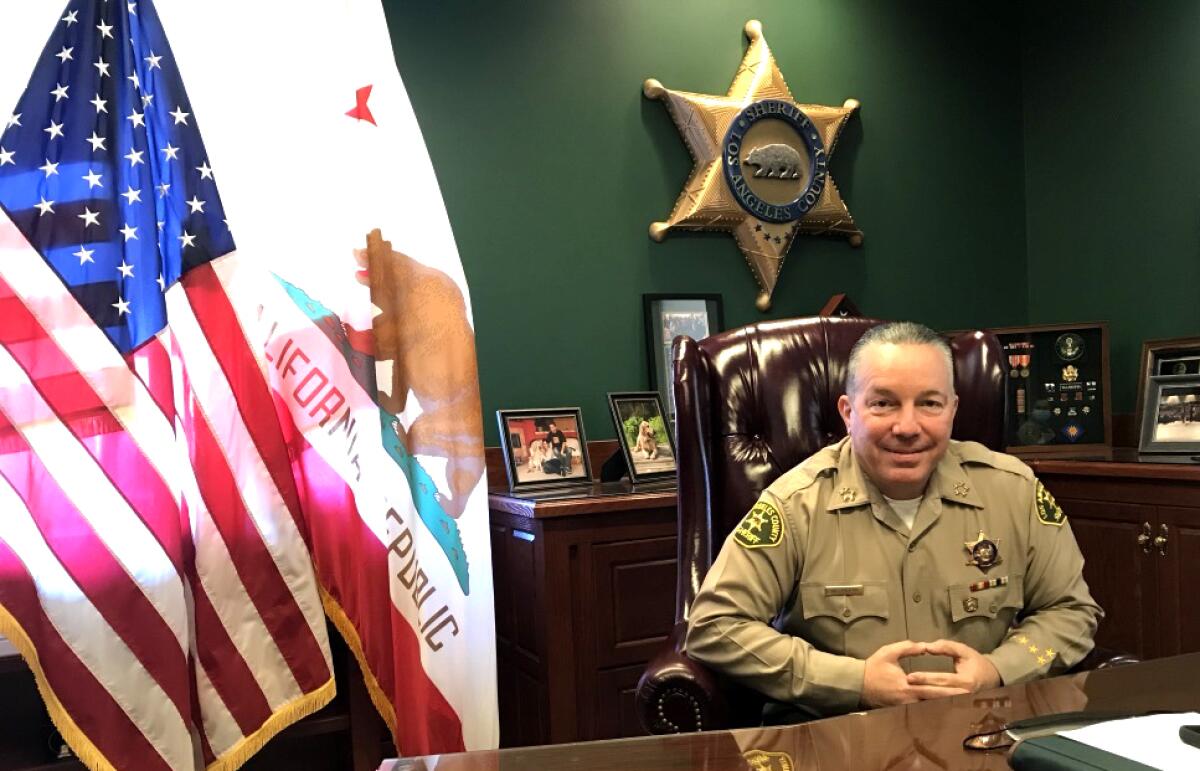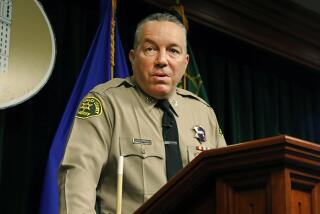Column: Sheriff Villanueva is angry — at elected officials, at The Times, at lawlessness

Los Angeles County Sheriff Alex Villanueva had a few things to get off his chest when we met in his office at the Hall of Justice on Monday afternoon.
I’d reached out to him after he spent a portion of one of his recent weekly Facebook Live events knocking me for criticizing his approach to moving homeless encampments off the Venice boardwalk, including threatening to arrest those who refuse to move after being offered room in shelter or hotels.
“Actually,” he told me, “arresting someone and putting them into our system gives them treatment they are not getting. We shouldn’t be in that position. It’s problematic. We want to avoid that. But am I going to celebrate that the guy died face down in the gutter, but at least he didn’t go to jail? That’s kind of a weird choice.”
Also, as he pointed out later in our 90-minute conversation, he oversees the county jails, where an estimated 30% of the population is in mental health units and/or on psychotropic medication.
“I know your periodical loves to throw rocks at the evil Sheriff’s Department,” he said, “but believe it or not, we have a lot of experience in managing the mentally ill population.”
Most of our chat was devoted to the humanitarian crisis engulfing our county, his disdain for the elected officials on whose watch it has occurred, and his deep frustration with the way he is covered by the Los Angeles Times, which he likes to call the “El Segundo Times,” a reference to where our offices are.
He accused The Times of being harder on Latino elected officials than white ones, of ignoring good news out of his department like his new Wage Theft Task Force, of having too few Latino columnists compared with Black columnists, and of undercovering Latino issues compared with those of other groups.
He’s even ticked off about the photos we run.
“Let’s find the ugliest photo we can of the sheriff,” he said sarcastically. “Look at every photo of Gavin Newsom, he’s looking up in the distance with his hair blowing and all this shit.” To take that issue off the table, I photographed the sheriff in a pose he decided on.
During his dramatic reading of my column on Facebook Live, he called me “sexist” for saying he’d muscled his way into the issue, and “racist” for describing his style as “bravado.”
“I was being facetious,” he said, when I asked what he meant.
But he did want to talk seriously about how to handle the huge increase in homeless people living on or near the coast, a subject of hot debate into which he has very publicly inserted himself.
Villanueva’s attempts to clear homeless encampments in Venice were intended as both a rebuke to local politicians such as L.A. City Councilman Mike Bonin and, in my view, a way to raise his profile among calamity-weary Angelenos in advance of his reelection campaign.
His actions were applauded by many Venice residents and business owners and condemned by many others, but he says they were necessary because of all the YouTube videos and TV reports about Venice that were ricocheting around the globe.
They were, he said, “telegraphing to the world, ‘Don’t come here. This is no longer a tourist destination.’ You would think the city of Los Angeles would be obsessed with preserving and protecting such an income-generating thing.”
When I noted that the pandemic surely contributed to the proliferation of tents in public spaces, he bristled.
“No, actually Venice became a victim of the incompetence of the mayor and City Council. Under the premise of the pandemic, they said, ‘Let’s not do anything and see what happens.’”
That in turn, he said, sent the message: Homeless people are welcome here.
“The point is, we can’t be the dumping ground for the entire nation’s homeless, and we are,” he said. “I can’t keep inviting people to drink out of the same glass of water. I run out of water at some point.”
In the last month, he told me, as his Homeless Outreach Services Team has worked alongside social service groups in Venice, placing people in shelters, his deputies have also made 33 arrests in the area — for possession of drugs, possession of drugs for sale, suspected car theft, and outstanding warrants.
“Everybody we arrest goes to jail,” he said. But whether charges are filed “is another story.”
He was referring to another of his nemeses, local prosecutors including L.A. County Dist Atty. George Gascón, who announced when he took office he would no longer prosecute a number of low-level, nonviolent crimes. In concert with Proposition 47, a law that reduced some low-level, nonviolent crimes from felonies to misdemeanors, the goal of this criminal justice reform effort is to get people into diversion programs instead of jailing them.
That’s not how the sheriff sees it.
“You are creating a lawless society if there’s no rule of law,” he said. “We are setting the stage where there is an expectation that you can just go in and take stuff from a business and no one is going to oppose you.”
::
The county’s most fractious elected official has been in office only three years, but in that time, he has alienated the Board of Supervisors, which controls his budget; the Sheriff Civilian Oversight Commission; the Los Angeles City Council; the L.A. mayor; and the local Democratic Party.
Is there anyone in local politics he admires?
“Oof, that’s a tall order,” he said. “I’m taking on the architects of failure right now.”
After a moment, he settled on Phillip Chen, a Republican state assemblyman who supported him in 2018: “He took heat for endorsing a Democrat, so on principle, he’s a stand-up guy.”
Villanueva’s brief tenure has been marked by all sorts of scandals and battles — his ongoing attempt to reinstate a deputy who was fired after being accused of domestic violence; accusations that he has not been tough enough on identically tattooed deputies in so-called gangs; his labeling of an inquest into the death of a young security guard who was shot in the back by a deputy five times as a “circus stunt”; his verbal attacks on other officials, including a long-serving county chief executive who was awarded $1.5 million as a result.
In all these cases, he denies being at fault.
“There are no gangs,” said Villanueva, who in February 2020 created the department’s first official rule against employees forming or participating in any action that violates the law or department policy, or harms a member of the public or a fellow employee.
“There are cliques,” he said. “There is a huge leap between ‘clique’ and ‘gang.’ … You can’t terminate someone because they exercise their 1st Amendment right, which includes a tattoo. If you connect it to misconduct, yeah, you are on solid ground.”
The sheriff likes to remind people that he has delivered on the very campaign promises that appealed to the coalition of liberals and Latinos who gave him his upset victory over incumbent Jim McDonnell in 2018.
“Everything I campaigned on, I delivered on,” he said. “Did I campaign on body-worn cameras? We have body-worn cameras. Did I campaign on kicking ICE [Immigration and Customs Enforcement] out of the jail? ICE is out of the jail.”
But many of the progressives who voted for him feel betrayed, as my colleague Alene Tchekmedyian wrote July 12. And as he faces reelection with a weakening base, he seems to be swerving right — with a promise to issue more permits to carry concealed weapons (which I will address Wednesday, in Part 2 of this interview) and his law-and-order take on the homelessness crisis.
He denies swerving in any direction.
“I am exactly who I said I was when I ran,” he said.
More to Read
A cure for the common opinion
Get thought-provoking perspectives with our weekly newsletter.
You may occasionally receive promotional content from the Los Angeles Times.










